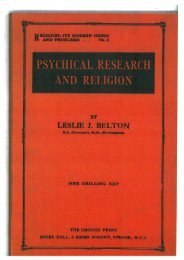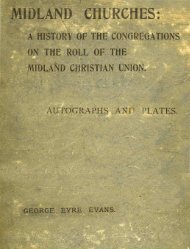Essays in Unitarian Theology by Kenneth Twinn Lindsey - General ...
Essays in Unitarian Theology by Kenneth Twinn Lindsey - General ...
Essays in Unitarian Theology by Kenneth Twinn Lindsey - General ...
You also want an ePaper? Increase the reach of your titles
YUMPU automatically turns print PDFs into web optimized ePapers that Google loves.
@<br />
ESSAYS IN UNITARIAN THEOLOGY<br />
I would not agree that the proposition " God is Love "<br />
is equivalent to some such proposition as " dustb<strong>in</strong>s are<br />
future-~erfect ". But what of the criterion of verifia-<br />
bility? L Perhaps the l<strong>in</strong>guistic philosophers are on<br />
surer ground here. How can the claim that God is<br />
love bk verified? What is the evidence?/ How would<br />
the world differ from the world as we know it if the<br />
opposite were true? Admittedly, this is a harder nut<br />
to crack, but before we tackle it, it is perhaps <strong>in</strong>struc-<br />
tive to exam<strong>in</strong>e what would presumably be the answer<br />
of those who accept the critique of l<strong>in</strong>guistic analysis,<br />
but who nevertheless still cl<strong>in</strong>g to the validity-<strong>in</strong> some<br />
non-metaphysical sense-of the proposition c c God is<br />
love ".<br />
'0 , They would <strong>in</strong>sist, I suppose, that they believe that<br />
God is love because they have felt his love <strong>in</strong> their<br />
hearts. and are aware of it <strong>in</strong> their lives, as someth<strong>in</strong>g<br />
/<br />
quite apart from, and not <strong>in</strong> the least evidenced <strong>by</strong>,<br />
external circumstance. They would po<strong>in</strong>t to the<br />
experience of Jesus, who " for the joy that was set<br />
99 .<br />
before him, endured the cross, despis<strong>in</strong>g the shame ,<br />
the experience of Paul, who, <strong>in</strong> spite of " tribulation,<br />
nakedness, peril and the sword ", was persuaded that<br />
noth<strong>in</strong>g: could ever separate him from the love of God<br />
<strong>in</strong> ~hYist Jesus. he^ would further adduce the<br />
ex~erience of the sa<strong>in</strong>ts, who felt the love of God as a<br />
I<br />
present reality, even <strong>in</strong> the midst of persecution and<br />
torment. An <strong>in</strong>terest<strong>in</strong>g example of Christian awareness<br />
of the love of God, even when all the circumstances<br />
seem to contradict it, is furnished <strong>by</strong> an <strong>in</strong>cident from<br />
the life of the Quaker sa<strong>in</strong>t John Wilhelm Rowntree.<br />
When threatened with serious eye-trouble, he consulted<br />
a specialist, who <strong>in</strong>formed him that there was no hope.<br />
BELIEF IN GOD 35<br />
He went out from the consultation [says his biographer]<br />
under the doom of com<strong>in</strong>g and irreparable bl<strong>in</strong>dness. He<br />
stood <strong>by</strong> some rail<strong>in</strong>gs for a few moments to collect himself,<br />
and suddenly felt the love of God wrap him about as<br />
though a visible presence enfolded him, and a joy filled<br />
him such as he had never known before."<br />
Now it is obvious that such pragmatic verification of<br />
the reality of the love of God cannot be ignored.<br />
The scientist certa<strong>in</strong>ly does not disregard such methods<br />
when test<strong>in</strong>g the validity of his hypotheses. Indeed,<br />
the extent to which modern medical science, for<br />
example, is pragmatic and empirical is often frankly<br />
astonish<strong>in</strong>g. Many modern treatments <strong>in</strong>clud<strong>in</strong>g the<br />
adm<strong>in</strong>istration of such drugs as cortisone, and even<br />
such drastic processes as shock-therapy and bra<strong>in</strong> sur-<br />
gery, appear to be based on no surer foundation than<br />
that, <strong>in</strong> many cases, for some unknown reason they<br />
appear to work. Pragmatism, then, has a valid place<br />
-especially when it forms but one l<strong>in</strong>k <strong>in</strong> a cha<strong>in</strong> of<br />
evidence. But to make experience of the love of God<br />
the proof of that love, or even the chief ground for<br />
believ<strong>in</strong>g <strong>in</strong> it, is very dangerous. 1.t clearly plays<br />
straight <strong>in</strong>to the hands of those sceptics who <strong>in</strong>sist that<br />
the proposition cc God is love " merely means cc I feel a<br />
warm <strong>in</strong>ner security ". It is, of course, quite con-<br />
ceivable that when a person says he feels a warm, <strong>in</strong>ner<br />
security, especially <strong>in</strong> the face of adversity, he does so<br />
because he is actually aware of the love of God as an<br />
external reality. But it is also conceivable (as some<br />
psychologists argue) that he merely feels a warm <strong>in</strong>ner<br />
security because he was subjected to the right methods<br />
of cleanl<strong>in</strong>ess-tra<strong>in</strong><strong>in</strong>g m his <strong>in</strong>fancy.<br />
* Quoted Inner Light, a devotional anthology (First Series), p. I I 6.






